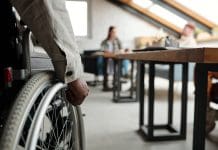Barry Stanton, head of employment at Boyes Turner explores the impact of working with long covid in the construction industry, where absences could compound the existing skills shortage
The Government has lifted the restrictions surrounding Covid-19 with further changes to take place on 1 April 2022. One might therefore consider that the impact of the pandemic is over. Given current sickness levels, this is not true. In particular, for those suffering from long covid the ordeal continues.
For many who have been vaccinated Covid symptoms have meant mild flu-like symptoms and for others, the outcome has been more severe, although generally a full recovery will have been made within 12 weeks. However, the long-term effects of Covid-19 can be many and varied, extreme fatigue, shortness of breath, problems with memory and concentration, dizziness, depression and anxiety, tinnitus and a loss of taste or smell, to identify a few.
None of those symptoms is pleasant, but for many who are office-based, they do not pose significant issues for those working in the construction industry the impact of long-term Covid-19 can have serious implications. The disabling effect of long-covid will impact the ability of contractors to undertake projects. Typically, with colds and flu, one would expect a worker to return to work after one or two weeks. However, it is clear that for a significant number of people long-covid will prevent them from working for an extended period of time.
The Office for National Statistics reported in December 2021 that 1.3 million people were reporting the impact of long covid, having symptoms for at least four weeks, with 893,000 reporting having had symptoms for more than 12 weeks and 506,000 having had symptoms for over a year. The majority of cases are in the age range 35-69.
For those who are workers or contractors, as opposed to employees the impact of long-term Covid-19 will mean an inability to earn, whilst the impact of Covid-19 continues. Even for those who are employees, there will be a real risk that any contractual sick pay will expire, and that the employee will be forced to rely on statutory sick pay (SSP), or that the SSP will expire.
Given the definition of disability in the Equality Act 2010, it is possible that over half a million people may be suffering from some form of disability, meaning that employers have an obligation to make reasonable adjustments for them, which might mean transferring work to others or finding an alternative role. Making employment decisions about those who have suffered from a disability for 12 months or who are likely to suffer from a disability for that period. Equally, those who have symptoms for more than four weeks might fall into the category of being disabled.
Working with long covid: Employers have a duty of care
Employers have a duty of care to their workers to provide a reasonably safe working environment. For those who have suffered from Covid and return to work it will be important, given the nature of the work and working environment that suitable and adequate return to work interviews and risk assessments are conducted to ensure that individuals are not unreasonably and unnecessarily exposing themselves, and others, to danger by returning to work when they are not fully fit. Without a suitable and sufficient return to work, process businesses will be at risk of accidents occurring on site.
Within the construction industry, some will be “safety critical workers” who must not be suffering from medical conditions or be taking medication. This encompasses roles such as scaffolders, those working at height where control measures are not practicable and plant operators. For those in safety-critical roles, the need for proper checks and assessments is paramount to avoid breaches of regulations such as the Management of Health and Safety at Work Regulations (1999) and associated fines for the employer.
For those in safety-critical roles or those who are more exposed to risk, employers should consider ensuring that the worker receives medical clearance. Those involved in work requiring physical exertion may require checks on heart and lungs; where pre-existing health conditions have been aggravated by long covid then these should be reviewed. Individual risk assessments should be undertaken, and account made for those in safety-critical roles by making reasonable adjustments or finding suitable alternative roles.
Where employers have any doubts then they should involve occupational health professionals to guide them on the most appropriate steps to take.














